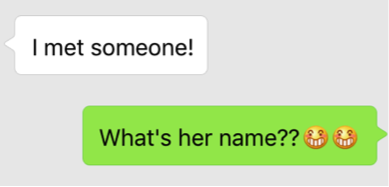It is very difficult to talk to Chinese people without using emojis. Whenever a Chinese friend Facebook messages me, I feel compelled to reply with WeChat because there are messages and nuances that can only be expressed with emojis that only exist on WeChat.

The difference between emojis on Chinese and Western apps can shed light on some interesting cultural disparities. I have noticed that Chinese messaging apps tend to have a lot more emojis for expressing deference and embarrassment (with elements like blushing)—traditional Chinese culture prizes humility and indirectness. You can never ask someone a favor without profusely expressing how bad you feel; you can never ask for someone’s time without showing that you think you are hardly worthy of their time.
Below are some emojis that I use most frequently while communicating on WeChat, but do not really have equivalents on Western messengers like Facebook Messenger and iMessage.
1. 
Official Name: Shy
Actual Meaning:
- I’m better than you, but I want you to know that I’m not just better but also humble
- I have a favor to ask of you but I don’t want to appear blunt
Function:
- Humble brag
- Downplay one’s achievements
- Ask for a favor
Example:

2. 
Official name: Blush
Actual meaning:
- I have a favor to ask of you but I don’t want to come across as an asshole
- Damn it. Are you sure you can’t do anything more about it?
- I’d love to help you but I really can’t
Function:
- There’s a Chinese phrase called “Mai Meng”, which literally translates into “selling cuteness” (in order to achieve your goal). This is the quintessential Mai Meng emoji; great for asking favors from someone you are familiar with
- Express helplessness/deep unhappiness/disappointment
Example:

3.
Official Name: Smile
Actual Meaning:
- I don’t know you that well and I don’t want to come across as over-friendly, but I want to create a friendly atmosphere
- I’m asking you a favor and it would be inappropriate for me to use any of the other favor emojis because they are way too cute and you are more senior/older than me
Function:
- To maintain a professional yet friendly relationship
- To tell someone something very serious without coming across as mean
*Note: DO NOT use this with friends (unless you are over 40), otherwise your friend will think you are trying to end the friendship by treating them like a stranger. For friends, use ![]() or
or ![]() instead.
instead.
Example:

4. 
Official Name: Trick
Actual Meaning:
- Look at you!!!
- I have an idea that I think we’ll both like
Function:
- Tease someone
- Emphasize the novelty of your idea
Example 1:

Example 2:

5. 
Official Name: Fight
Actual Meaning:
- I respect you a lot and I’m ready to learn from you
- Sorry for troubling you
- Thank you so much
* Note: This is a salute commonly used in Chinese Kung Fu before people fight each other. It is a mutual show of respect for each other’s skills and abilities.
Function:
- For greeting when you first meet someone who is more senior or older
- When you are asking a favor of someone that you respect
Example:

6. 
Official Name: Chuckle
Actual Meaning:
- This is not really funny but I’m laughing to lighten the situation
- I’m giving you advice but I don’t want to sound rude
- I’m going to ask a favor of you
Function:
- Humble brag/express smugness
- To soften the tone when you’re giving someone suggestions
Example 1:

Example 2:

7. 
Official Name: Scowl
Actual Meaning:
- What the hell?!
- Are you serious? I can’t believe this happened.
Function:
- Express surprised disappointment/outrage
Example:

8. 
Official Name: Grimace
Actual Meaning:
- I’d love to help you but I really can’t
- I can’t believe things turned out this way, but here’s what happened
- This is really awkward
Function:
- Breaking bad news
- Asking for a difficult favor
- Express embarrassment or regret
Example:

I’ve written more about WeChat here, here, and here.
I write a weekly email newsletter on tech trends in China, and co-host a podcast on US-China cross-border tech. Subscribe and listen at 996.ggvc.com.
Nice explanation. I do like the WeChat emoji designs more than any other format. But on WeChat I find myself using stickers much more often than emojis and that’s something not even available on most other platforms. Most people i know tend to buy the sets available but I’m also a fan of WeChat’s ability to upload your own. My custom set of stickers is very big and I tend to use them even more than the sticker sets I download.
just like to say I enjoy reading your articles..
Hi, Thank you for explaining some of the WeChat emojis here. I work as an education consultant and many clients communicate exclusively this way. Now I can avoid making mistakes.
Andrea